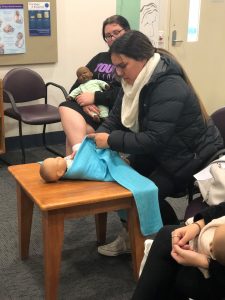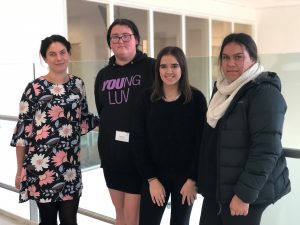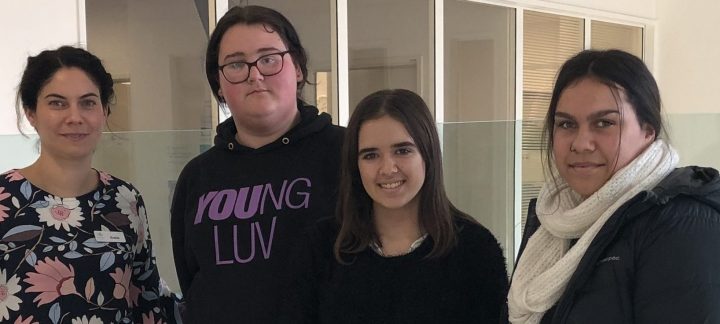While the Australian population is made up of 3.3 per cent Indigenous Australians, only about one per cent of people working in health-related occupations identify as Aboriginal or Torres Strait Islander people. To help increase the number of Indigenous Australians working in health, Mercy Health has developed a Mercy Health Aboriginal Employment Plan.
Earlier this year, Mercy Health implemented one component of its Aboriginal Employment Plan when it invited three Indigenous students to participate in a work experience program at Mercy Hospital for Women.

Students are taught how to swaddle a baby.
“The health sector has a very low number of Aboriginal and Torres Strait Islander employees,” Mercy Health Group Diversity and Inclusion Coordinator Erana Tito says. “So our committee looked at what we could do to increase that figure. We thought that by exposing young Indigenous students to a health setting, particularly those students who hadn’t yet decided on a career path, then that might help to encourage more Indigenous Australians to join the health workforce.”
Mercy Health partnered with schools and Weenthunga Health Network to recruit three Indigenous students for a work experience program at Mercy Hospital for Women in July this year.
“We wanted to make the program a meaningful experience for students so focused on three components,” Erana explains. “We shortened the shadowing of workers from four to two-hour blocks, we included a cultural educational workshop and importantly, we added a project into the program. I really wanted the students to develop a meaningful piece of work specific to Mercy Health.”
I think we need more Indigenous health workers because our people love to be treated by their own people.
— Student Tara Crumpen-Slade
During the four-day program, the three students learned what life was like as a midwife, a nurse, a sonographer, a physiotherapist, a dietitian, a clerical support worker and an Aboriginal Hospital Liaison Officer. They also worked on a brochure during their time with Mercy Health, one that explains the benefits of participation in the Mercy Health Indigenous work experience program.
“The girls were really positive about their time here,” Erana says. “At the end of their experience, two of the students are keen to pursue a career in health. We think that’s a pretty good result.”

L-R: Mercy Health Group Diversity and Inclusion Coordinator Erana Tito with students Imogen Manderson, Tarlisha Simpson and Tara Crumpen-Slade.
Last reviewed October 24, 2019.



